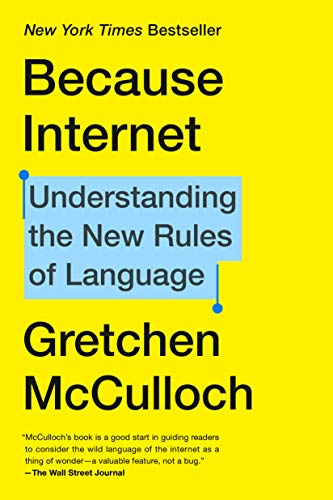

Full description not available
C**C
Enjoyed
I find this quite hard to review. As someone whose degree is languages and day job is tech, I've loved Gretchen's Twitter and blogs and excitedly had this book on pre-order since the first day it was available.I found it really, really interesting, at many points I texted friends with interesting things I'd found, and things I'd forgotten about from the usage of internet past (I'd totally forgotten o.O ever used to be a thing). I'll probably be handing this book out and passing it around friends.However I couldn't help feel that there was just something missing. I found the book quite easy to put down and forget to pick up again, despite the fact I started reading it within ten minutes on day one that I received it, it took me three days to finish. I'm definitely going to be excitedly handing it out to friends, but I have a gut nervousness I can't quite place that worries that they just won't like it.Overall, I'm really glad I read it and I'm not disappointed. I can definitely imagine myself rereading it, especially in a few years to look back at how it aged. Perhaps it's just a victim of my own overhyped expectations?
J**J
Internet language studied from the inside
This is the first book I have ever preordered, and it did not disappoint. Gretchen McCulloch is the only linguist I have ever read who describes internet language from the perspective of an insider who actually uses and understands it. It's clear that she is really embedded in internet culture and analyses the way real people communicate online - unlike some writers who just describe what they think 'kids these days' are probably doing with emojis behind their backs.I would recommend this read to anyone who ever uses the internet to communicate. If you socialise heavily online, you'll enjoy recognising patterns of communication that you really use, and seeing them carefully explained and analysed. If you don't, you'll get a better understanding of how other people are benefitting from the internet, and of what their idiosyncratic online communication really means.
S**N
A defence of the Internet's role in language development
When I grew up, the Internet was regularly chastised by 'serious' people for bringing about the death of grammar. That was obviously nonsense, and this book provides a robust and comprehensive explanation of how language has developed as a result of the web. The author clearly understands online culture, and gives interesting examples to illustrate the easily accessible and natural narrative. It has made me want to learn more.
W**L
My fiancee loved it
My fiancee really liked it, although I've not read it yet, the bits she has read to me were great!
E**W
Because Internet
This was to give as a present so I really know little about it. It was, however, received with pleasure.
E**
Learnt lots and highly entertaining
Really enjoyed this - accessible to me as a non-linguist and often very funny read that made me think too.
P**I
-
-
H**Z
Y not?
This will be a fascinating book for linguists and anyone interested in writing and the development of words. Speaking and writing are distinct tasks, with the former less formal than the latter, but with the advent of the internet and social media, writing has never come closer to speech. This book traces the history of writing, focussing on the era post 1990. Humour abounds in this book. McCulloch recalls how people in 1804 end their letters with, ‘I have the honour to be your obedient servant’, as Alexander Hamilton and Aaron Burr did, only for the two men to end up fighting a duel. She also refers to research studies, including one in 2007 which found that the biggest gaps in internet use was ‘not between adults and middle-aged people but between people who were over and under age fifty-five’. There are people who use the internet by immersion and those (older ones) who needed a travel guide. Thus rules emerge as shaped by practice, to dictate that ‘email’ should not be hyphenated or capitalised, and how to punctuate acronyms, if at all, of words like ‘lol’. McCulloch takes us through minimalist typography of the ‘younger-people’ and through the various ways of expressing tone of voice in internet communication. One of the many useful thoughts expressed in this book, is the lack of editing in social media and chats generally. Go with the tide, or go pro?
Trustpilot
5 days ago
2 months ago